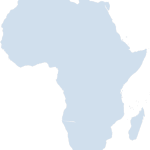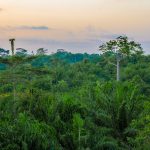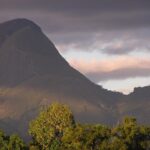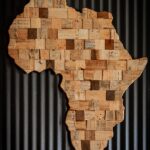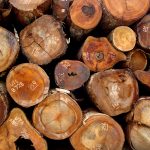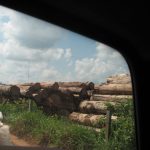
One of the most disturbing aspects of Mozambique’s deforestation crisis is the widespread corruption fuelling the illicit trade. Despite periodic crackdowns and regulations attempting to limit deforestation, enforcement remains ineffective due to deep-rooted corruption. Environmental organizations and watchdog groups have raised concerns about China’s role in illegal logging, but enforcement of trade laws remains inconsistent. Additionally, the lack of media coverage and public awareness further reduces pressure on policymakers to take action against this ongoing catastrophe.
A group of fifty-four employees working in the Quirimbas Nature Park in Mozambique has sent an open letter to new Mozambican President Daniel Chapo, asking him to stop the illegal timber logging and smuggling in the park, which was exposed earlier by ZAM.
The letter, sent anonymously for fear of repercussions, urgently asks for Chapo’s intervention to stop the plunder of trees by Chinese syndicates in collusion with the park’s management. It also asks Chapo to send in auditors to check on the park’s financial governance.
A ZAM transnational investigation conducted across six African countries has revealed the complicity of governing political elites in rapid deforestation. At the same time, many of these elites are receiving billions of dollars and euros in ‘green’ funds from international partners, including the UN, the EU, and the World Bank. Previous instalments of this investigation, already published by ZAM, have highlighted this pattern in Uganda, Nigeria, and Mozambique. The latest findings from Cameroon, Ghana, and Malawi are in line with the earlier results.
Kleptocrats on the continent are profiting from the illicit forestry trade, which is estimated by Interpol and the United Nations Environment Programme to be worth $51 billion to $152 billion annually. Short summaries of the issue provided for DRC, Mozambique, Zambia, Equatorial Guinea, Namibia, Zimbabwe, Gabon, Tanzania, Kenya.
According to the AQUA officials, the main culprit of the massive deforestation – which increasingly exposes the park to hurricanes and erosion – is a Chinese company. Success Investments is headed by Chinese tycoon Yu Guofa, nicknamed “Cabeça Grande”, which means “Big Head”. Earlier this year the company’s unprocessed and large-scale timber exports were exposed by the US-based Environmental Investigations Agency (EIA) as violating several Mozambican export bans.
EIA has also reported that Yu is known to boast of his “personal friendship” with Mozambican president Filipe Nyusi, as well as with local business tycoon and prominent ruling party Frelimo member General Chipande. Chipande owns businesses which were earlier implicated in a ZAM investigation into the devastating exploitation and overfishing of Cabo Delgado’s coastal waters. A source close to Yu told EIA investigators that “the General helps Mr Yu with timber documents.”
A four-year undercover investigation by the Environmental Investigation Agency (EIA), an NGO that campaigns against alleged environmental crimes, has found that timber smuggling from Mozambican forests to Chinese consumers generates an estimated US$23 million each year for terrorists and criminal networks in northern Mozambique.
While rosewood, an umbrella term for a wide range of tropical hardwoods, is protected under the international CITES (Convention on International Trade in Endangered Species of Wild Fauna and Flora) treaty, Islamist group al-Shebab in Cabo Delgado has been smuggling these precious trees and other flora and fauna products to fund their insurgency, generating an estimated US$1.9 million a month.
Over three million tons of West African Rosewood have been shipped to China since 2017. The logs are manufactured into high-end Chinese furniture and exported worldwide as part of a multi-billion dollar furniture industry.
In November, Wood Central reported that CITES had banned the felling, transportation, and exportation of West African Rosewood in response to Chinese traders’ “industrial-scale” exploitation of the timbers. That move, according to environmental watchdog forest-trends, is an acknowledgment that past measures to protect the species, known as P. erinaceus, have “not worked and that CITES Parties (who are responsible for the measures to verify the legality and sustainability of trade, have not been able to eradicate illegal trade alone.”
Now, a new report by the Environmental Investigation Agency alleges that the multi-billion dollar trade is showing no signs of slowing, despite CITES and the Gambian government’s both introducing outright bans on the harvest and distribution of the timbers.
The first high-resolution (5 m) and continental-scale
mapping of land use following deforestation in Africa, including humid and dry forests.
Results show, not surprisingly, that the causes of forest loss vary by region. In general, small-scale cropland is the
dominant driver of forest loss in Africa, with hotspots in Madagascar and DRC. In addition, commodity
crops such as cacao, oil palm, and rubber are the dominant drivers of forest loss in the humid forests of
western and central Africa, forming an “arc of commodity crops” in that region. At the same time, the
hotspots for cashew are found to increasingly dominate in the dry forests of both western and southeastern Africa, while larger hotspots for large-scale croplands were found in Nigeria and Zambia.
Mozambique’s forests are a treasure trove of biodiversity and natural beauty. Covering 43% of the country’s landmass, these native forests and woodlands are home to an array of unique landscapes and wildlife.
However, Mozambique is grappling with a major issue: illegal logging. Between 2017 and 2020, firms in the country illegally exported 2.6 million tonnes of logs worth $900 million in violation of the log export ban. An overwhelming majority of these shipments, 99%, were destined for China.
Illegal logging is a growing feature of transnational organized crime in Africa, often facilitated by the collusion of senior officials, with far-reaching security and environmental implications for the countries affected.
Cheringoma District Court in Sofala has given 14 individuals sentences ranging from four to six years in prison for committing environmental crimes in the Gorongosa National Park buffer zone. The offenders engaged in illegal logging and killing of animals, including elephants, buffalo, lions and pangolins.
The Mozambican authorities launched, in Maputo on Monday, a digital Forestry Information System (SIF) that will promote transparency, compliance with legislation and the computerization of forestry information It is estimated that Mozambique has 31.7 million hectares of forests, with at least 449 species of trees and a volume of 800 million cubic metres of wood.
Illegal loggers continue to devastate the forests of Zambézia province.
Although the Gilé National Park buffer zone and containment measures imposed by park supervisors there are providing some respite, there are reports that the southern part of the province is experiencing a new spike of illegal exploitation of Umbila wood.
Mozambique’s National Agency for Environmental Quality Control (Aqua) has seized over 2,000 cubic metres of wood that was being illegally exported through the port of Beira, in central Mozambique, the state agency said.
In 2020, eight Mozambican public officials and one Chinese national named Zhao were arrested for illegally harvesting and exporting timber from Cabo Delgado — Mozambique’s northernmost province — to China. According to local reports, five of the Mozambicans are awaiting trial while Zhao and three Mozambicans have been released, and the seized wood was returned to Zhao personally.
The Zanzibar Declaration on Illegal Logging, signed on Wednesday at a global gathering on forests in South Africa, aims to improve communication between customs authorities and collaboration among forest officials from the east and southeast African nations.
Kenya loses around $10 million annually due to the illegal cross-border wood trade with Tanzania, while Tanzania loses more than $8 million, according to studies cited by the World Wildlife Fund (WWF), a green group backing the new agreement.
Click here to access the Global Illegal Logging and Associated Trade (ILAT) Risk assessment tool and to download the Forest Trends User Guide describing the functionality of the ILAT Risk Data Tool.
Click here to access the Cattle Data Tool.



